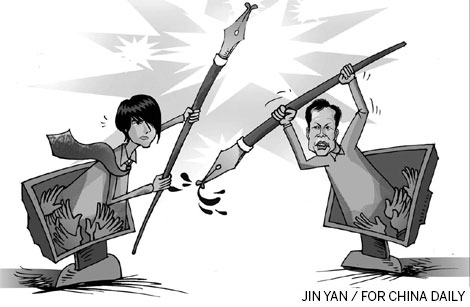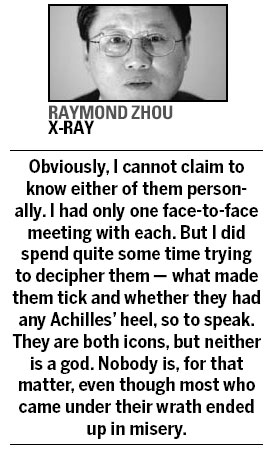Clash of the titans
Updated: 2012-02-12 10:44
By Raymond Zhou (China Daily)
|
||||||||

When a man of science finds fault with one of letters, sparks - and machetes - fly, mowing down two self-made celebrities who are giants in their own fields.
The biggest ruckus in China this past Spring Festival did not involve fireworks or overcrowded trains.
It stars two of the most influential personalities of the "it" generation, each in his prime of what he does and each with an oversized following that would make vote-coveting politicians envious.
Han Han, 30, is the most popular blogger in the world.
His "real" career as a best-selling author and a racecar driver, by comparison, seems to recede to the background. Fang Zhouzi, 44, is known as a fraud fighter, even though, by profession, he writes popular science books.
Both have made numerous enemies on their road to fame.

Han started by attacking the country's literary establishment and escalated to social phenomena.
Fang sets his sights mainly on the academic and business worlds, where puffing up resumes and scholarly theses is a common practice.
It so happens that I have written detailed profiles of both of them - Han Han on April 30, 2010, right before he was selected for Time magazine's "Most Influential" list of the year, and Fang Zhouzi on Aug 5, 2011, during a hiatus of his news-making hurricanes.
To interview Han, I bought all of his books and finished every word of them before drafting my questions.
Unfortunately, I failed to do the same for the Fang interview because his writings are all over the place and not neatly collected. But I did read up on the major incidents.
Obviously, I cannot claim to know either of them personally. I had only one face-to-face meeting with each.
But I did spend quite some time trying to decipher them - what made them tick and whether they had any Achilles' heel, so to speak. They are both icons, but neither is a god. Nobody is, for that matter, even though most who came under their wrath ended up in misery.
Han's strengths
It is an irony that, for all his immense popularity, Han has received scant analysis for his fiction.
I failed to dig up one book review or formal piece of criticism that appraises his novels or offers insight.
So, I had a feeling that he is overexposed but under-scrutinized. One can also say his fiction is totally overshadowed by his essays.
Instead of giving an in-depth evaluation of Han's writing, Fang Zhouzi essentially focuses on what he perceives as a fact-or-fiction loophole that goes beyond literary criticism and into the realm of conspiracy theory.
Fang says Han's early works could be ghostwritten because they are too good for a teenager.
Fang admits he did not bother to read Han's later works.
For me, that is the most ludicrous accusation.
Of all the writers I have read extensively, Han is one of the least likely to employ a ghostwriter. The simple reason: His is such a distinct voice that it is unimaginable his words flow from another pen or brain.
Moreover, Fang's suspicion that Han's father wrote for his son shows Fang has dubious taste in literature.
The main evidence he cites is Han quotes profusely - and thus displays a warehouse of knowledge - incompatible to his age (then a teenager). For my taste, that was exactly the traits of a literary novice, someone who uses quotation books to impress - a la name-dropping - and someone who had not developed a writing style of his own.
From my study of Han's works, both fiction and nonfiction, his evolution as a writer is quite traceable.
From the beginning, he has an aptitude for observing details and employing social satire, but he came under the influences of what he was reading at the time.
In Triple Door, his debut novel, he imitates Qian Zhongshu to a tee, something a youngster would be proud of but a mature writer would shun.
Han's fiction reveals he's uneven.
For one thing, he does not seem to possess the ability to plot.
In other words, his stories are not the stuff for movies or television drama. They are not meticulously structured either, rambling episodically from one chance encounter to another.
Strangely, he is not adept at conveying youthful romance, either. His depiction of calf love strikes me as more posturing than sincere or interesting. But then again, I'm not of his generation and may have failed to grasp its charm.
His main achievement in creative writing, in my opinion, is his talent to capture the zeitgeist through certain symbolic setups.
In An Ideal City (2005), two college students escape to a nondescript small city with a meandering wall that leads nowhere.
The dreamy scene with the protagonist running along the wall is both mesmerizing and thought-provoking. Later in the story, a succession of vehicles runs into a ditch, with spectators cheering for the drivers' bad luck. It reminds me of Lu Xun's short story in which a crowd stands by and watches the execution of a revolutionary rebel.
Han's 2009 novel A Day Dream (aka His Country) has more of such scenes that fuse reality with the eerily surreal world, all the while bringing out the acutest portrayals of the Chinese characteristic, weakness and all.
They can be read as parables or simple daydreams, but never does he trifle with the young adult genre where every tale ends happily ever after.
I believe these masterful narrative mise-en-scenes will put Han squarely in the league of the nation's best writers if only critics would cut through the dense halo that engulfs his now larger-than-life and entertainment-laced personality.
If Han still has readers 100 years into the future, it won't be his blog posts that now garner millions of hits but rather the more detached sketches of life that appear in his novels.
Han's vulnerabilities
Fang Zhouzi says he did not "intend to make a false charge" against Han.
Fang is one of those inscrutable figures, whom ideological factions on both sides believe belongs to the other camp. So, does he have an agenda in this latest high-profile attempt to topple Han Han?
Honestly there is no hard evidence, as what he uses against Han is mostly speculation or, to use a nicer word, analysis. However, for whatever motive he is waging this battle, he has a right to raise doubt as he sees it.
The biggest mistake in this bout of wrangling is Han's hasty and unprofessional response.
Perhaps because many business tycoons have faltered before Fang's feet, Han did not miss a beat in launching a counterattack, with some ill-fitted humor, thus appearing awkward and desperate.
But I can understand why he took the bait. For someone who makes living writing, there is no more serious allegation than the questioning of authenticity.
For all his uncharacteristic maturity, Han has just reached the age of 30 and has been sailing too smoothly. Sooner or later, he will encounter rough waves and blunder in his calculations.
When the first salvo was fired, I wrote on my micro blog that Han should feel proud rather than threatened.
Only writers of Shakespeare's stature have been the targets of constant suspicion about the authenticity of their oeuvres.
The implied rationale is that this guy's writing is so good we could not find anything in his education or upbringing to back it up.
Fang's tunnel vision
Coincidentally, the two people who cast doubt on Han this time - the one immediately before Fang is an IT professional - both have science backgrounds.
While Fang was the champion in his province's entrance exam's language skills section, Han was a champion of car racing but flunked many courses in high school.
Fang excelled in the nation's education system and Han defied it.
But Fang may have equaled the forfeit of regular advanced education with being uneducated.
It is true Han has not devoured tomes of scholarly works on history and politics, but he is able to keep a balance between acquiring knowledge and maintaining independent thinking.
And there is no doubt he is a genius when it comes to creative expressions, both verbal and written.
But is that the reason he should be brought down the pedestal?
As an icon of youthful rebellion, he is shrouded in a thick layer of adulation, some self-wrought. But one cannot deny the substance even when all his style is stripped off as frothy.
Fang is something of a genius as well.
The PhD from Michigan State University has been tackling frauds in biochemistry, medicine, religion and now literature, among other disciplines.
Using his own logic, one can question whether he has amassed the necessary knowledge to appear as a figurehead in so many fields. Could it be possible that he sometimes sees only trees but ignores the forest?
Maybe the scientific mind would not tolerate the fuzzy literary and artistic mind.
Otherwise, how can Fang cite Han's mention of a literary character sleeping in the upper berth in one work and the lower berth in another as evidence for literary scam?
Even in an autobiography can the protagonist have inhabited different spaces of a bunk bed at different times.
For a long time, I have admired both Fang and Han for what they do.
Ideally, there should be institutes or a legion of firebrands who challenge the status quo.
By circumstances or by design, these two stepped into their current roles, but they should beware of their own limitations.
Sure, everyone should enjoy full freedom of speech, even when - or especially when - that speech is targeted at those with power and influence.
But isn't it too much to ask that a voice carrying authority stick to his or her areas of expertise?
I, for example, wouldn't believe Han Han if he pontificated biochemistry.

 'Taken 2' grabs movie box office crown
'Taken 2' grabs movie box office crown
 Rihanna's 'Diamonds' tops UK pop chart
Rihanna's 'Diamonds' tops UK pop chart
 Fans get look at vintage Rolling Stones
Fans get look at vintage Rolling Stones
 Celebrities attend Power of Women event
Celebrities attend Power of Women event
 Ang Lee breaks 'every rule' to make unlikely new Life of Pi film
Ang Lee breaks 'every rule' to make unlikely new Life of Pi film
 Rihanna almost thrown out of nightclub
Rihanna almost thrown out of nightclub
 'Dark Knight' wins weekend box office
'Dark Knight' wins weekend box office
 'Total Recall' stars gather in Beverly Hills
'Total Recall' stars gather in Beverly Hills
Most Viewed
Editor's Picks

|

|

|

|

|

|
Today's Top News
Health new priority for quake zone
Xi meets US top military officer
Japan's boats driven out of Diaoyu
China mulls online shopping legislation
Bird flu death toll rises to 22
Putin appoints new ambassador to China
Japanese ships blocked from Diaoyu Islands
Inspired by Guan, more Chinese pick up golf
US Weekly

|

|







